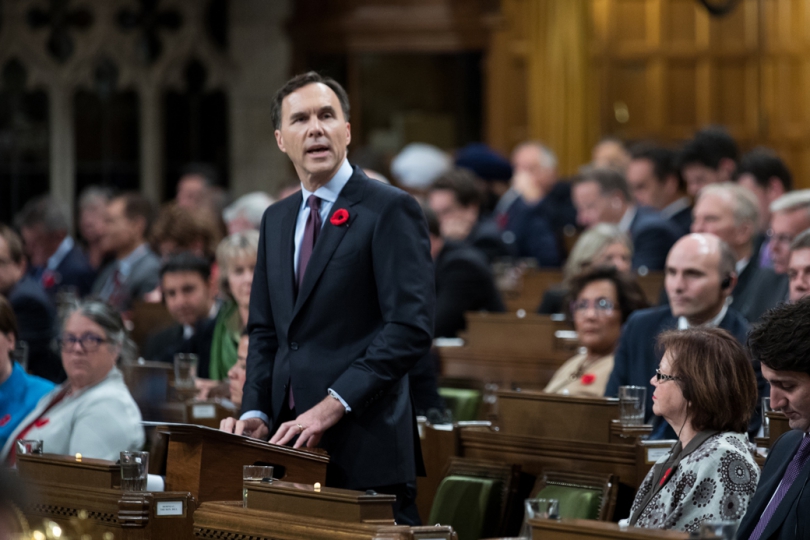Should profits made in Canada be taxed in Canada? Is it right that millionaire CEOs get 50 per cent discounts on income tax? Is it fair that rich people use tax havens to dodge paying their fair share?
These questions have made headlines since the Liberals’ first budget in 2016. When Finance Minister Bill Morneau delivers Budget 2017 Wednesday, it will reveal if he has been listening to regular Canadians.
Morneau recently raised hopes by telling G20 Finance Ministers that the world should follow Canada’s “tax the rich” plan – adding that closing loopholes and fighting international tax evasion are critically important to the G20. Following through on those comments is essential.
Morneau did take positive steps in his last budget by adding a new tax bracket for top income earners. He also earmarked resources for the Canada Revenue Agency to target wealthy tax dodgers’ tax havens. But it was tentative. Most loopholes remain intact and rules still enable large corporations to lower taxes by shifting profits to tax haven subsidiaries.
So, if Finance Minister Morneau is serious about tax fairness, here are three things he could include in his March 22 Budget.
The Stock Option Loophole
Under current tax law, CEOs and corporate directors can be paid in stock options and cash them in later drawing millions in income. But, unlike a regular salary, the first 50 per cent of stock option income is tax free. The original idea was to help small start-ups attract top talent during their formative years. But the biggest users are bank presidents, resource company execs and real estate moguls. They’ve co-opted this loophole to dodge taxes – and it works.
Research done by the Canadian Centre for Policy Alternatives showed that 75 of Canada’s 100 top-paid CEOs received part of their income as stock options enabling combined savings of $495 million, or $6.6 million each. That’s half a billion dollars of forgone revenue to subsidize 75 very rich people.
During the last election, the Liberals seemed as outraged about this as the rest of us. They promised to axe this loophole. But budgets are often more prone to lobbyists than to wisdom or even vision. In 2016, the Finance Minister blinked when corporate lobbyists leaned in. The 2017 Budget is a chance for a do-over. It is a promise made that Canadians believed. Voters will be paying attention.
Tackling Tax Havens
There is $219-billion of Canadian money sitting in the top 10 offshore tax havens. That doesn’t include recently publicized offshore schemes like KPMG’s Isle of Man or Panama Paper revelations. Canada could fund Pharmacare or a national Child Care Program with this lost tax revenue.
In 2016, Morneau announced $444-million over five years to rebuild the CRA’s decimated international tax evasion enforcement program. Good start. It resuscitated government response to this epidemic of entitled behaviour. But despite a series of media releases announcing how tough they are, the CRA hasn’t provided evidence of real impact on the nearly $8 Billion a year in lost revenues from tax haven use.
After media revelations about secret deals between the CRA and KPMG, the federal Parliamentary Finance Committee held hearings on how Canada should be handling the tax haven issue. Their final recommendations included a directive that financial advisers be required to register tax products with the government. Unregistered products would automatically be considered illegal. The CRA Minister has indicated agreement. It is important the Finance Minister support her in that endeavour and call out sketchy tax advisors in this budget.
Levelling the Digital Playing Field
If you “Netflix and chill,” click on Google ads, or use Uber, you are part of the new economy. Digital giants make millions — even billions — in profits every year from Canadians. That is not likely to change.
Despite massive profits, multinational companies get away with paying little or no tax here. The CRA grants an exemption based on a ruling that no bricks and mortar means they’re not conducting business in Canada. Tell that to their shareholders.
This budget must address the special status that foreign digital companies have in paying corporate and value added tax. It can’t solve all the problems facing Canadian media, but it can ensure that an outdated tax system that gives preferential treatment to global competition doesn’t add to their challenges.
Government can do a lot more to implement fair taxation. Canadians deserve a budget and a vision that gets our tax system on track. Anything less is a broken promise.
Deficit financing is not ideal. Tax fairness is key to raising additional revenues needed to deliver on promises such as aboriginal child welfare, child care, health and education. Canadians for Tax Fairness has shown that there is an additional $40 billion that could be raised by implementing fair tax policies, without raising taxes for the majority of Canadians.
There is no excuse for a stand-pat budget when money can be found from fair tax measures to fund a much more ambitious agenda of investing in public services, job creation and action on climate change.
Dennis Howlett is the executive director of Canadians for Tax Fairness.
Like this article? Please chip in to keep stories like these coming.
Image: PMO/Adam Scotti




